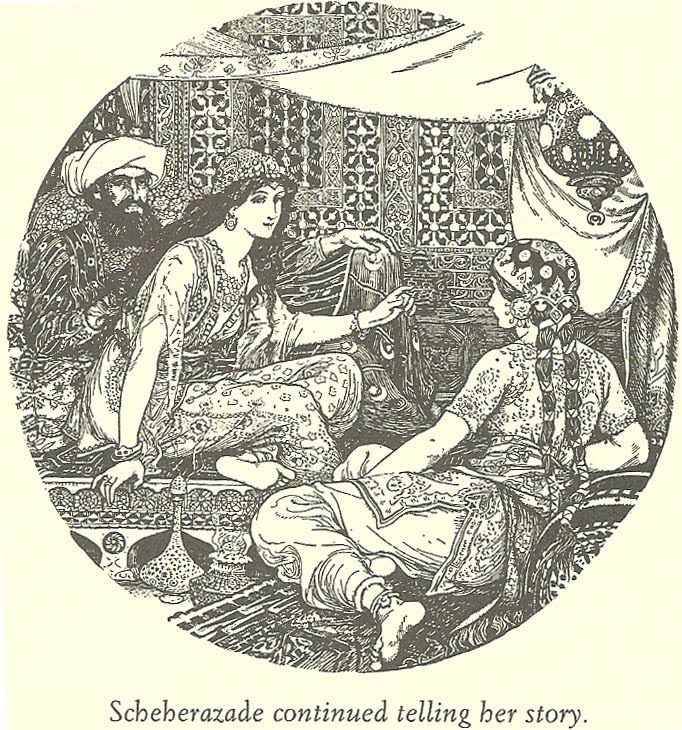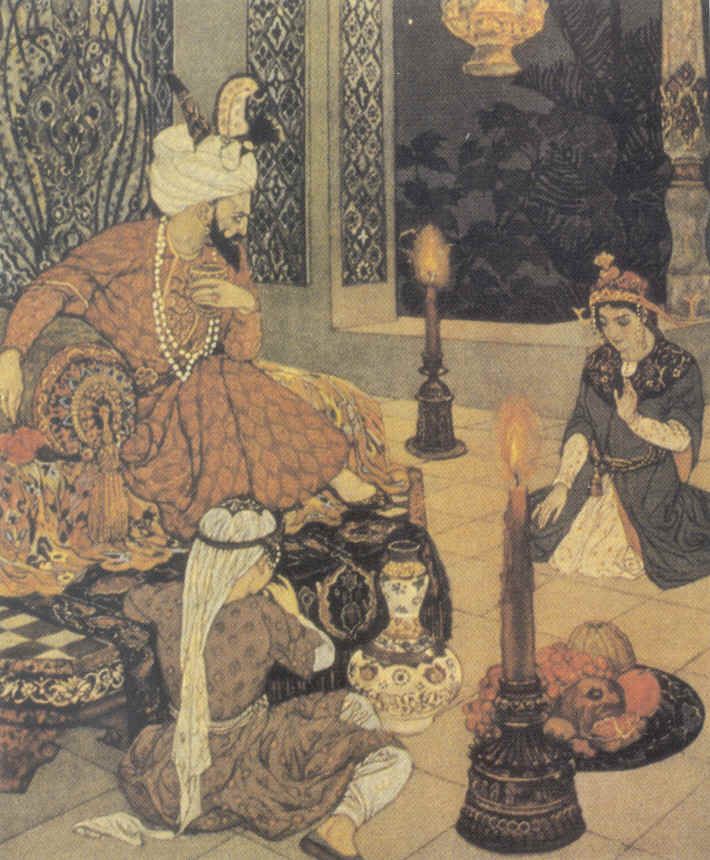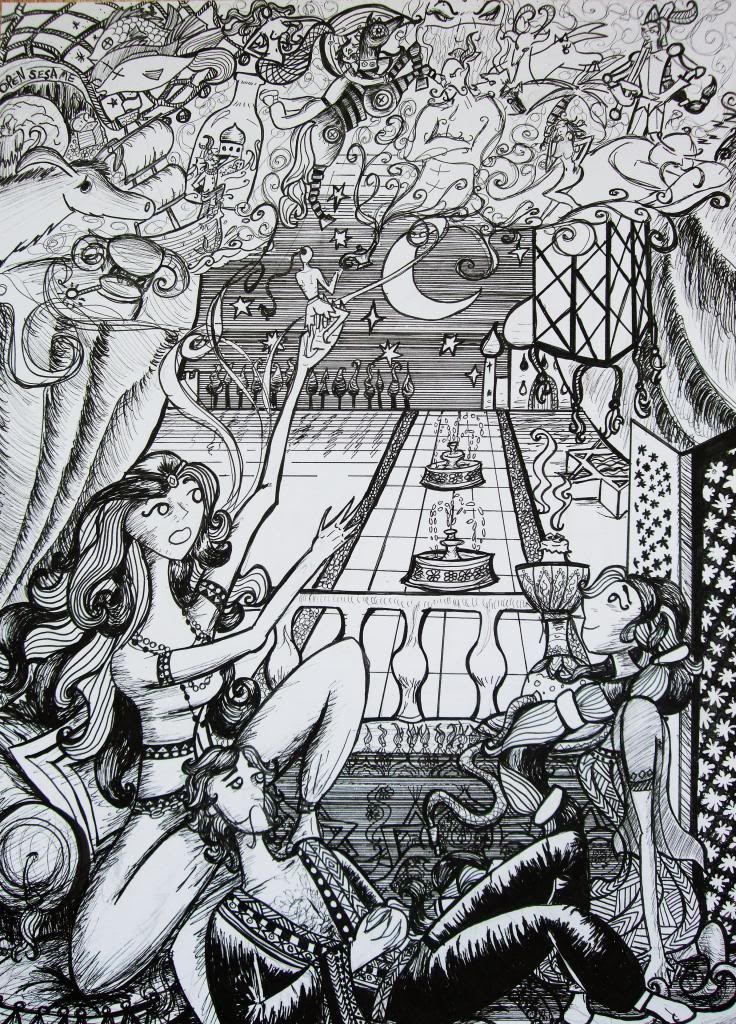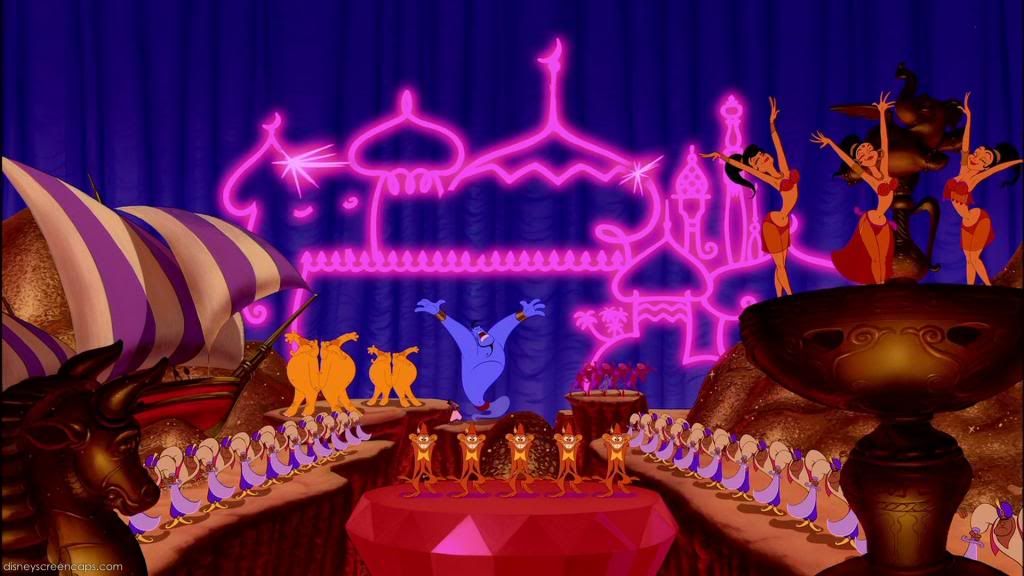Many of us in the West probably got our first exposure to this week’s featured character while singing along with the Genie. He told us that “Ali Baba had them forty thieves, Scheherazad-ie had a thousand tales;” being a character in one of these tales, he should know.
In his introduction to a recent edition of The Arabian Nights, otherwise known as One Thousand and One Nights, Ken Mondschein describes the collection, in its many and varied forms, as “the text from the Muslim world that is most widely read in the West and thus the most identified, in popular culture, with Arabic history and customs.” We see its influence in everything from Budweiser commercials to Disney movies, from symphonies to comics. However, although it is in many ways the West’s favourite gateway to the East, it is one that we built, leading to a land that we envisioned. The collection is a work of literary transmission spearheaded by the West and, as Mondschein suggests, “there is no transmission without transformation, and in many ways, the reception of the Nights tells us more about our own culture than it does about the Muslim world.”
The edition that I will be using is a translation originally issued in 1885-6 by Sir Richard Burton, a figure heavily identified with the spread of the stories in the English-speaking world. This is a deliberate choice, as this post is intended to be read alongside this week’s Miscellaneous Monday post. While that article discussed many of the positive, transformative aspects of reworking stories, Burton’s version of the Nights demonstrates the negative consequences of creative translation. His problematic work includes what Mondschein terms “salacious details,” intended to indulge his contemporaries’ orientalist attitudes at the expense of accuracy.
 |
| From the Reader's Digest edition |
The frame story in which the thousand tales are told begins with a smorgasbord of infidelity. Two kings, Shahryar and Shah Zaman learn that their wives are cheating on them and, after a brief, self-fulfilling quest to find another man who has been similarly wronged, they conclude that all women are malicious, untrustworthy, and unworthy of power. They return to their respective kingdoms, where they -- having both already executed their wives -- put into action a plan to wed a virgin each night, bed her, and put her to death in the morning. This goes on for three years before Shahryar finds himself all out of virgins, all of them having fled or been killed, and all out of goodwill from his subjects.
This is where Scheherazade enters the story. She is something of a narrative nerd and has “perused the books, annals and legends of preceding Kings, and the stories, examples and instances of bygone men and things; indeed it was said that she had collected a thousand books of histories relating to antique races and departed rulers. She had perused the works of the poets and knew them by heart; she had studied philosophy and the sciences, arts and accomplishments; and she was pleasant and polite, wise and witty, well read and well bred.” She is an academic par excellence and something of an inspiration for those of us who spend most of our lives consuming and discussing stories. Who knows when we might find ourselves in a situation where we need to tell hundreds of stories in order to distract a mass murderer for years at a time?
Scheherazade is the elder daughter of the king’s vizier and, as the vizier has been responsible for carrying out the executions, she and her sister, Dunyazad, have been spared. When her father refuses to let her marry the king, she defies his authority in such a way that proves that he has no real power over her. Even after he threatens to beat her, she remains defiant, secure in the knowledge that she could bring the king’s ire upon him should she tell Shahryar that her father prevented the marriage. She also proves herself able to resist the lessons of stories, as she does when her father uses a tale to try to dissuade her from her task. As she says, “I will never desist, O my father, nor shall this tale change my purpose. Leave such talk and tattle. I will not listen to thy words and, if thou deny me, I will marry myself to him despite the nose of thee.”
 |
| Léon Carré |
To do this, she enlists the help of her sister, who will request that Scheherazade tell her (and the king) a story on the wedding night. Scheherazade plans to tell only part of a story each night, keeping the king in suspense and herself alive to finish the story -- and start another -- the next evening. This continues for 1001 nights, during which time Scheherazade gives birth to three sons. While she suggests that the latter accomplishment should earn her a pardon, Shahryar assures her that it was her ingenuity, piety, and purity that convinced him to spare her life. It seems, however, that it was actually her stories that did the trick. When she concludes her last tale, she reminds him that he should keep things in perspective, as many of the characters she told him about had to deal with far worse troubles than his own. Then, with her stories complete, “she ceased to speak, and when King Shahryar heard her speech and profited by that which she said, he summoned up his reasoning powers and cleansed his heart and caused his understanding revert.” It is her words, specifically, that restore the king’s sense and allow him to relinquish his prejudice. The man who condemned women comes to view Scheherazade as a saviour sent to stop the oppression and slaughter of Allah’s creatures.
Before I get into the more symbolic meaning of Scheherazade’s storytelling, I’d like to take a moment to discuss it on a literal level. This woman, with the threat of death hanging over her head for the better part of three years, manages to remember and retell a thousand stories. Not only does she remember them, but she recounts them with enough style and timing to keep her audience riveted for more than thirty months. So, for a period of time during which many television shows cannot hold our attention airing once a week with hiatuses, Scheherazade tells stories that earn her her continued existence. That’s pretty damn impressive. (It also makes me wonder if we wouldn’t have better programming if we implemented a similar model for modern writers. I jest, but this may be the only way to make Glee bearable again.)
 |
| Laura Swinton |
Beyond her status as the fictional character telling stories about fictional characters that have become the West’s basis for imagining the Middle East, what gives Scheherazade her lasting (pop) cultural importance? On some level, she is a kind of cultural liaison to an imaginary culture and, despite being fictional herself, her presence legitimizes the stories. For a Western audience, she is the narrator who allows us to pretend that the tales remain authentic despite decades of translation. For some modern women, she is a point of identification, a homegrown alternative to the kind of Western feminism that so rarely grasps the intricacies of Middle Eastern life.
In the age of fanfiction, we can also find value in Scheherazade as the prototypical female fan creator. She familiarizes herself with stories in order to remake them to suit her needs. Like William Shakespeare, Jean Rhys, and Gregory Maguire, she validates derivative work, proving that it can build upon the original. She demonstrates the necessity of storytelling and the power of words; in Scheherazade, we see a woman who appropriates men’s stories in order to save women’s lives.
Verdict: Actual strong female character


Megan, thanks for this analysis of Scheherazade. I am doing research on this character for a story I am writing, and I find your comments illuminating.
ReplyDeleteI'm glad you found it helpful.
DeleteThis was very helpful! Im playing Sheherazade in a play and this really helped me get an insight on her as a person! :)
ReplyDeletea very insightful piece!! of great help
ReplyDeleteExcellent analysis.
ReplyDelete